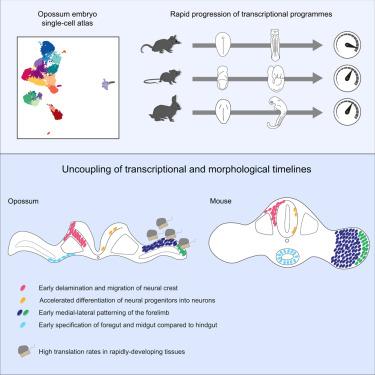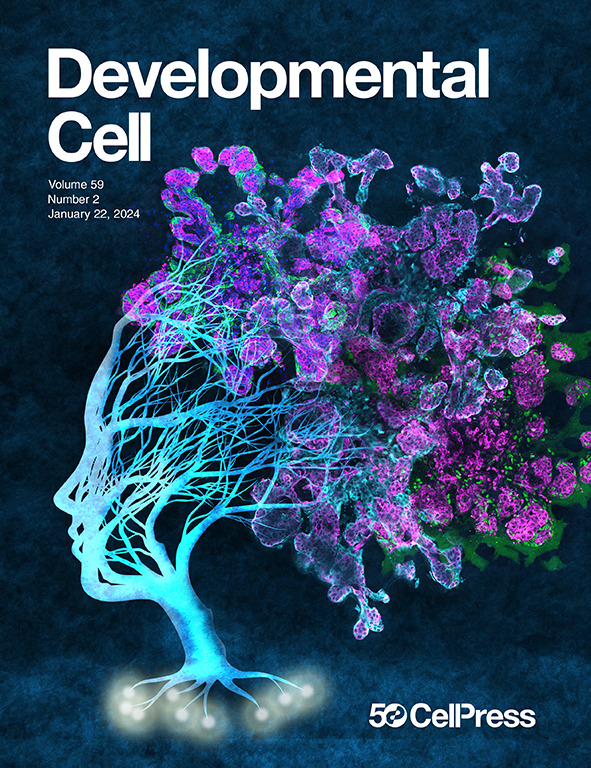有袋动物单细胞转录组学鉴定哺乳动物发育程序的时间多样性
IF 8.7
1区 生物学
Q1 CELL BIOLOGY
引用次数: 0
摘要
单细胞转录组学已经证明了哺乳动物器官发生的保守和不同的程序,但现有的研究主要集中在真动物身上。有袋动物表现出较短的妊娠期和完整的外部发育,需要加速运动和摄食所需的前部特征的分化。因此,他们代表了研究发育时间变化的独特外群体,称为异时性。在这里,我们生成了一个单细胞转录组图谱的原肠胚形成和早期器官发生的有袋动物,负鼠单delphis domestica。我们确定了以前未记载的组织经历异时性,并发现形成前结构的转录程序相对于真动物启动更早,进展更快。结果是转录和形态时间线的解耦,揭示了哺乳动物发育序列中不可预见的多样性。利用我们的转录组学数据集,我们确定翻译是一种候选的控制机制,通过这种机制可以实现前向优先排序。我们的发现为有袋动物的发育程序的非同步进展提供了见解。本文章由计算机程序翻译,如有差异,请以英文原文为准。

Marsupial single-cell transcriptomics identifies temporal diversity in mammalian developmental programs
Single-cell transcriptomics has demonstrated conserved and divergent programs of organogenesis in mammals, but existing studies have focused on eutherians. Marsupials exhibit short gestation and complete development externally, necessitating accelerated differentiation of anterior features required for locomotion and feeding. Hence, they represent a unique outgroup for studying temporal shifts in development, known as heterochrony. Here, we generate a single-cell transcriptomic atlas of gastrulation and early organogenesis in a marsupial, the opossum Monodelphis domestica. We identify previously undocumented tissues undergoing heterochrony and find that transcriptional programs that form anterior structures initiate earlier and progress faster relative to eutherians. The result is uncoupling of transcriptional and morphological timelines, revealing unforeseen diversity in mammalian developmental sequences. Using our transcriptomic dataset, we identified translation as a candidate control mechanism by which anterior prioritization is achieved. Our findings provide insight into the asynchronous progression of developmental programs in marsupials.
求助全文
通过发布文献求助,成功后即可免费获取论文全文。
去求助
来源期刊

Developmental cell
生物-发育生物学
CiteScore
18.90
自引率
1.70%
发文量
203
审稿时长
3-6 weeks
期刊介绍:
Developmental Cell, established in 2001, is a comprehensive journal that explores a wide range of topics in cell and developmental biology. Our publication encompasses work across various disciplines within biology, with a particular emphasis on investigating the intersections between cell biology, developmental biology, and other related fields. Our primary objective is to present research conducted through a cell biological perspective, addressing the essential mechanisms governing cell function, cellular interactions, and responses to the environment. Moreover, we focus on understanding the collective behavior of cells, culminating in the formation of tissues, organs, and whole organisms, while also investigating the consequences of any malfunctions in these intricate processes.
 求助内容:
求助内容: 应助结果提醒方式:
应助结果提醒方式:


